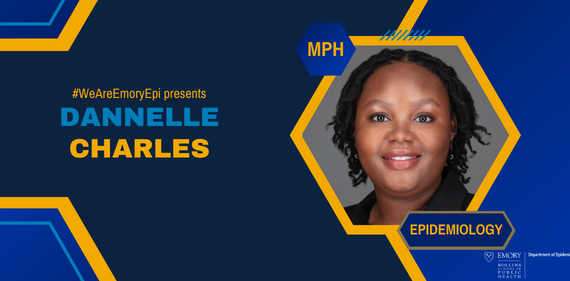#WeAreEmoryEPI: Meet Dannelle Charles!
Category : #WeAreEmoryEPI
Meet Dannelle Charles! She is a first-year MPH Candidate in the Epidemiology Department and is our second department representative on the Rollins Student Government Association. She’s interested in the health of Black and Indigenous/Latine health. Let’s hear more about her.
Tell us about your academic history/where you went to school.
I completed my undergraduate degree at the University of South Florida in Tampa, Florida, in 2022. While there, I obtained a Bachelor of Arts in Psychology and a minor in Public Health.
What are your primary research interests?
My primary research interests are maternal and child health. I want to focus on the Black infant and maternal mortality rate, maternal substance use, and Black & Indigenous/Latine reproductive health. I am also interested in focusing on health disparities and family needs assessment.
Are there any exciting projects that you are currently working on that you’d like to share with us?
Currently, I am working on a qualitative project focusing on identifying the barriers to adjuvant endocrine therapy (AET) adherence among Black women with hormone receptor-positive breast cancer. The primary focus is on Black women because of their low adherence rates to AET compared to white women. For this project, we interviewed both patients and providers.
What is your favorite part about earning your MPH at Emory?
My favorite part about earning my degree at Emory thus far is the connections I’ve made with my peers! I appreciate that everyone genuinely wants to help each other out and is rooting for one another. I have noticed that we all have a similar theme in the trajectory that brought us here at Emory; you’ll always feel seen and heard here.
When applying, what were you looking for in a public health school, and what factors drove you to pick Rollins?
At Rollins, I would be mentored by faculty in my niche research interest and be in the public health capital of the world. What really drove me to pick Rollins was the exchange of positive experiences from alums when reflecting on their time in the program, from the courses to faculty to peer-to-peer interactions.
What advice do you have for people who may be interested in getting their MPH?
Go for it! What’s amazing about this degree and public health is that it’s multidisciplinary, so you’ll still be able to utilize what you’ve learned in these two years, regardless of your chosen career, after earning your MPH.
What are three fun facts that you want people to know about you?
- I’m a first-generation graduate student.
- I’m a loud and proud Haitian-American.
- I have a three-octave range.
Thanks for talking with us, Dannelle! Tune in next week to see who we talk to next!
